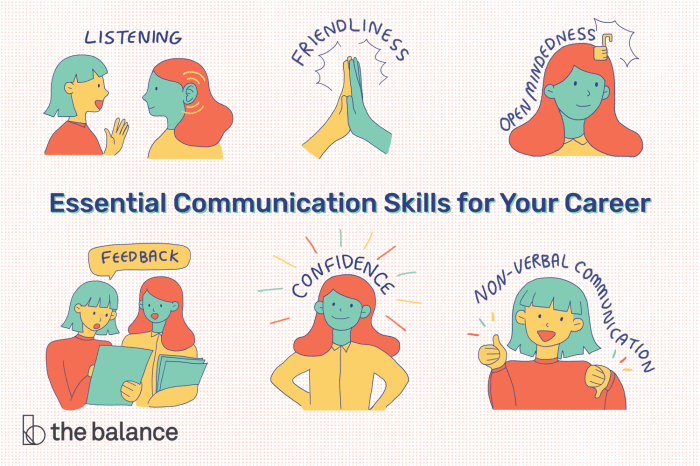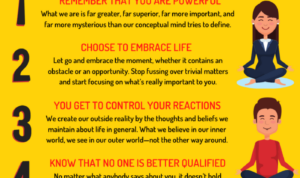Effective Communication Skills are the key to unlocking success in all aspects of life. From building strong relationships to advancing your career, mastering these skills is essential. Let’s dive into how you can improve your communication game and level up your interactions.
Whether you’re a budding entrepreneur or a high school student looking to ace your presentations, honing your communication skills is the ultimate tool in your arsenal. Let’s explore the components, strategies, and barriers of effective communication together.
Importance of Effective Communication Skills

Effective communication skills are essential in both personal and professional settings. In personal relationships, clear communication helps build trust, resolve conflicts, and strengthen bonds. For example, expressing emotions openly and actively listening to your partner can lead to a deeper connection and a healthier relationship. On the other hand, in professional settings, effective communication is key to success. It can lead to better collaboration among team members, improved productivity, and increased chances of career advancement. For instance, being able to convey ideas clearly during a presentation or effectively negotiating with clients can set you apart in the workplace.
Impact of Poor Communication Skills
Poor communication skills can have detrimental effects on both personal and professional relationships. In personal relationships, misunderstandings caused by poor communication can lead to arguments, resentment, and even breakups. For example, failing to express your needs clearly or misinterpreting your partner’s words can create tension and conflict. Similarly, in the workplace, poor communication can result in missed deadlines, project failures, and strained relationships with colleagues. Ineffective communication can also lead to misunderstandings with clients, damaging your reputation and hindering career growth. It is crucial to continuously work on improving communication skills to avoid these negative consequences.
Components of Effective Communication Skills
Effective communication skills consist of various key components that are crucial for successful interactions. Let’s explore how each component plays a vital role in enhancing communication effectiveness.
Active Listening
Active listening is the foundation of effective communication. It involves fully concentrating on what is being said, understanding the message, and responding thoughtfully. By actively listening, you show respect and empathy towards the speaker, leading to clearer communication and building stronger relationships.
Clarity
Clarity in communication ensures that your message is easily understood by the listener. It involves being concise, organized, and using simple language to convey your thoughts effectively. When you communicate with clarity, there is less room for misunderstandings or confusion, leading to more productive conversations.
Empathy
Empathy is the ability to understand and share the feelings of another person. By being empathetic in your communication, you create a supportive and caring environment that fosters trust and connection. This component is essential for building rapport, resolving conflicts, and showing genuine concern for others’ perspectives.
Non-Verbal Communication
Non-verbal communication includes gestures, facial expressions, body language, and tone of voice. It plays a significant role in conveying emotions, attitudes, and intentions during interactions. Being aware of your non-verbal cues and interpreting those of others can enhance the overall understanding and effectiveness of communication.
By incorporating active listening, clarity, empathy, and non-verbal communication into your interactions, you can improve communication outcomes, strengthen relationships, and achieve greater success in both personal and professional settings.
Strategies to Improve Communication Skills

Effective communication is essential in all aspects of life, whether in personal relationships, academic settings, or professional environments. Here are some strategies to enhance your communication skills:
Improving Active Listening Skills
Active listening is a crucial component of effective communication. To improve your active listening skills, make sure to:
- Give the speaker your full attention by maintaining eye contact and avoiding distractions.
- Ask clarifying questions to show your interest and understanding of the message.
- Paraphrase what the speaker has said to ensure you have grasped the content accurately.
- Avoid interrupting and allow the speaker to express themselves fully before responding.
Enhancing Clarity in Communication, Effective Communication Skills
To communicate more clearly, focus on structuring your messages effectively and using appropriate language. Here are some tips:
- Organize your thoughts before speaking to ensure a coherent message delivery.
- Use simple and concise language to convey your ideas without confusion.
- Avoid jargon or technical terms that may not be understood by all parties involved.
- Provide examples or analogies to clarify complex concepts and ensure comprehension.
Cultivating Empathy in Communication
Empathy plays a significant role in building strong connections with others. To cultivate empathy in your communication, consider the following:
- Put yourself in the other person’s shoes to understand their perspective and emotions.
- Show genuine interest in the other person’s feelings and experiences.
- Practice active listening and validate the other person’s emotions to demonstrate empathy.
- Avoid judgment and criticism, and instead, focus on understanding and supporting the other person.
Overcoming Communication Barriers: Effective Communication Skills
In order to effectively communicate in diverse environments, it is crucial to overcome common communication barriers such as cultural differences, language barriers, and emotional barriers. By understanding these obstacles and implementing strategies to address them, individuals can foster better communication and collaboration.
Cultural Differences
Cultural differences can lead to misunderstandings and misinterpretations in communication. To overcome this barrier, it is essential to approach interactions with empathy, open-mindedness, and a willingness to learn about other cultures. By actively listening, asking questions, and seeking to understand different perspectives, individuals can bridge cultural gaps and promote effective communication.
Language Barriers
Language barriers can hinder communication, especially in multilingual environments. To overcome this challenge, individuals can use tools such as translation apps, gestures, and visual aids to enhance understanding. Additionally, simplifying language, speaking slowly, and confirming comprehension can help bridge the gap created by language differences and ensure clear communication.
Emotional Barriers
Emotional barriers, such as stress, fear, or past experiences, can impact communication by clouding judgment and creating tension. To address emotional barriers, individuals can practice active listening, empathy, and emotional intelligence. By acknowledging emotions, validating feelings, and creating a safe and supportive environment, individuals can overcome emotional obstacles and promote open and honest communication.
By recognizing and addressing common communication barriers, individuals can cultivate a more inclusive and effective communication environment, leading to improved relationships, teamwork, and overall success.
